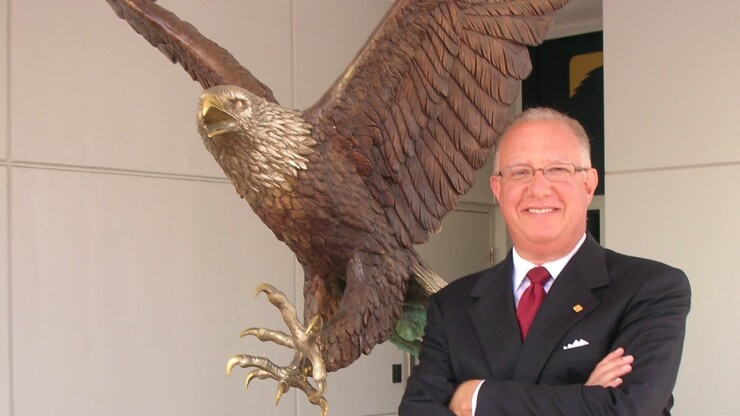Claims of dubious insider dealings have sent Eagle Bancorp’s stock on a wild ride.
The Bethesda, Md., company's stock had recovered some ground in early morning trading after plummeting by nearly 25% on Friday. The free fall came after a group called Aurelius Value claimed it had “uncovered evidence of an insider loan scheme" involving Ronald Paul, Eagle’s chairman, president and CEO, and certain other directors.
The group alleged that Paul had received large undisclosed loans from Eagle and that there are “financial entanglements” between the bank’s largest borrowers and Paul. Aurelius also claimed that loans to companies owned by insiders were “distressed.”

Eagle issued two press releases rejecting the allegations. In a Friday release, the company claimed that Aurelius was “an anonymous online firm that supports short-sellers,” calling the group’s piece “deceptive and materially misleading.”
Eagle said it believes the report was meant to “manipulate and depress” its stock price, pointing to a 36% increase in short positions in the month before the article came up. The report was largely based on two pending lawsuits, one of which Eagle isn’t a party to, the company said.
Eagle issued a second response on Sunday to again emphasize that the piece was the work of a short seller. The company noted that it is against the law for a short seller to manipulate the market with misinformation, while pressing the appropriate government agencies to act.
“There is a long list of successful banks and other public companies that this short seller has attacked recently in order to make a fast buck,” Eagle said. The release noted that people who want to access the Aurelius article must click on a disclaimer stating that the piece cannot be relied on for accuracy.
“Companies that have been attacked have asserted that the short seller and its cohorts have misrepresented the facts and are attempting to illegally manipulate the market,” the Sunday release added.
Aurelius, for its part, claimed that Eagle has made $180 million in loans to finance Paul’s private real estate company undisclosed transactions “that may violate the law.” Paul’s company also has undisclosed financial stakes in real estate developments tied to two of Eagle’s borrowers, who have received significant loans from the bank, the report alleged.
Eagle’s board has also lost its independence, Aurelius claimed. Some independent directors allegedly received loans or some other benefit from bank transactions. The report also claims that directors have received more than $80 million in loans.
Aurelius said it claims were based on “exhaustive forensic investigation” that included analyzing thousands of pages of public documents, court records and corporate entity ownership records.
The back and forth created a topic of discussion Monday for those who follow Eagle.
While Eagle seemed to address the questions of legality regarding any transactions between Paul and the bank, Casey Whitman, an analyst at Sandler O'Neill, wrote in a note to clients that she is unsure how the situation will play out. "We see a worst case scenario as the regulators do find a problem and/or the CEO must step down, in which case the company could potentially explore a sale," she added.
"There are some linkages that raise more questions than answers," Whitman said, adding that the claims by Aurelius "could have long-term ramifications especially considering the CEO has been such a driving force behind the company and for many investors, the reason why they have gotten into the stock."
Loans to officers and directors are "quite common," Joe Gladue, an analyst at Merion Capital Group, wrote in his client note, adding that related-party transactions must be disclosed to regulators.
"Our discussions with management ... indicate that some of the loans identified in the article as 'undisclosed' do not meet the definition of a related-party transaction and thus by definition would not be disclosed to regulators as such," Gladue added. "Management also states that all loans referenced in the article fully comply with all legal requirements."





